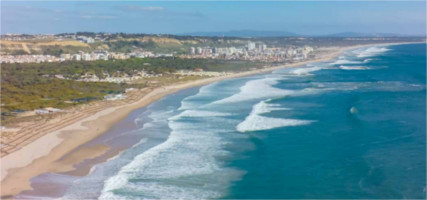Speaker
Dr
Elmar P. Biernat
(Centro de Física Teórica de Partículas (CFTP), Instituto Superior Técnico (IST), Universidade de Lisboa, Av. Rovisco Pais, 1049-001 Lisboa, Portugal)
Description
We introduce a covariant approach in Minkowski space for the description of quarks and mesons that exhibits both chiral-symmetry breaking and confinement. Our interaction kernel in momentum
space is the sum of a $\delta$-function potential and a covariant generalization of
the linear confining interaction. We assume a Lorentz vector structure for the $\delta$-
function and a mixed equally-weighted scalar-pseudoscalar structure for the
confining part. With this Lorentz structure, the kernel preserves the axial-
vector Ward-Takahashi identity and our model complies with the Adler zero
constraint for $\pi$-$\pi$-scattering imposed by chiral symmetry.
Within this model, we have calculated the dressed quark mass function in Minkowski
space. In order to compare our mass function with Euclidean approaches, our result is analytically continued to the region of negative four-momenta squared, where it is fitted to the existing lattice QCD data.
As a first application the mass function is used, together with a dressed off-shell
quark current that satisfies the vector Ward-Takahashi identity, in the calculation of the pion electromagnetic form factor. Our result for the form factor depends on the pion mass $m_\pi$, in particular, at small $Q^2$. The value $m_\pi=0.42$ GeV gives the best fit to the experimental data. At large $Q^2$, our pion form factor exhibits the typical monopole behavior and we find an interesting scaling behavior between the form factors calculated with different pion masses.
Author
Dr
Elmar P. Biernat
(Centro de Física Teórica de Partículas (CFTP), Instituto Superior Técnico (IST), Universidade de Lisboa, Av. Rovisco Pais, 1049-001 Lisboa, Portugal)
Co-authors
Prof.
Alfred Stadler
(Departamento de Física, Universidade de Évora, 7000-671 Évora, Portugal)
Prof.
Emílio Ribeiro
(CeFEMA, Instituto Superior Técnico (IST), Universidade de Lisboa, 1049-001 Lisboa, Portugal)
Prof.
Franz Gross
(Thomas Jefferson National Accelerator Facility (JLab), Newport News, Virginia 23606, USA and College of William and Mary, Williamsburg, Virginia 23188, USA)
Prof.
M.T. Peña
(Centro de Física Teórica de Partículas (CFTP), Instituto Superior Técnico (IST), Universidade de Lisboa, Av. Rovisco Pais, 1049-001 Lisboa, Portugal)
